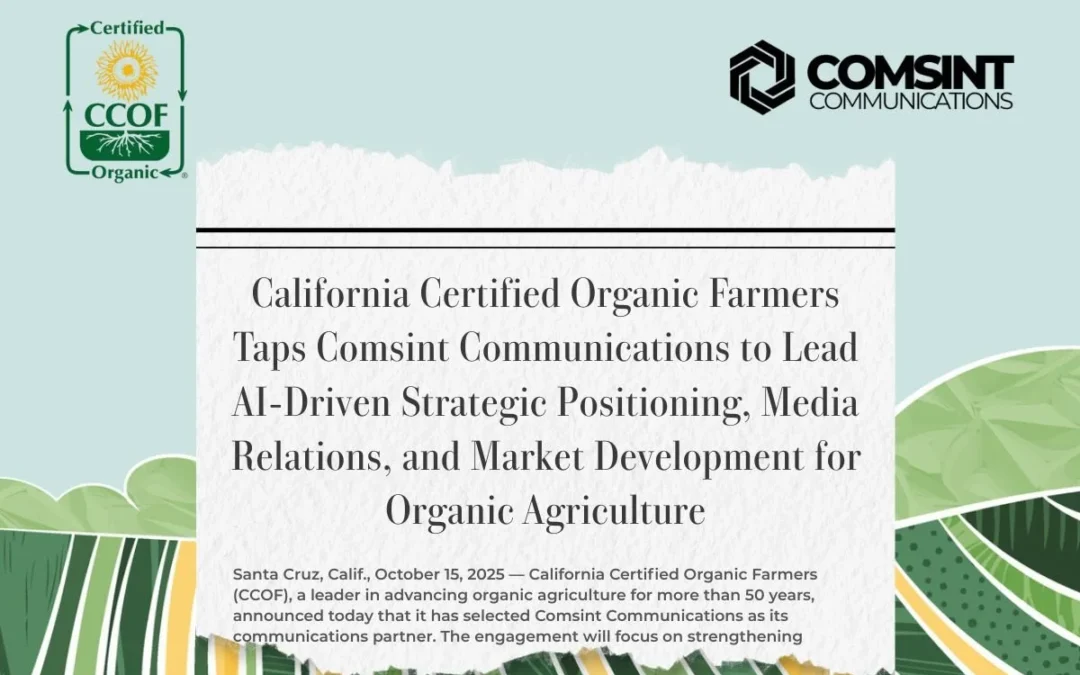CCOF recently announced a “partnership” with Comsint Communications — a boutique communications firm with expertise in crisis and reputation management. The timing seems particularly appropriate for what could be a continuing storm of negative press.
The Office of the Inspector General at the USDA launched an investigation of the certification giant concerning conflicts of interest that include hundreds of thousands of dollars of payments from corporate agribusinesses they certify.
More recently, two nonprofits released research indicating, possibly due to these economic conflicts, a gross failure to discover serious animal abuse, antibiotic use, and even spraying cattle with diesel fuel for fly control on the farms associated with one of CCOF’s former board members.
In April 2025, CCOF began a search for Media Relations proposals to provide public relations strategy and media support, funded by a USDA marketing grant.
In an October 2025 press release, CCOF celebrated their perfect timing and perfect “communications” partner. CCOF describes Comsint as a partner with much broader capabilities than they originally sought, an expert in:
- AI-Powered Strategic Positioning: Using proprietary tools like the Narrative Intelligence Framework, Comsint applies AI-driven analysis of policymaker language, consumer sentiment, and media trends to craft narratives that resonate across diverse audiences.
- Media Relations: With deep relationships across national outlets such as The New York Times, Forbes, CNN, and The Washington Post, Comsint’s team has a track record of securing high-impact coverage that shifts perceptions and builds momentum.
- Market Development & Brand Stewardship: Comsint’s strategies are designed not only to expand consumer engagement and elevate producer voices, but also to build and protect brands in competitive markets. And, possibly most interesting, by aligning messaging with USDA programs and consumer expectations.
The October press release simply ignored the fact that their new partner is an expert that, “In moments of crisis [will provide] strategic counsel to navigate today’s complex, rapid-fire media environment… to manage crises and reputation risk… and prepare for and manage critical moments, combining proven judgment with real-time intelligence to protect both immediate and long-term organizational value.”
Comsint is not just a media relations firm, they “help organizations strengthen trust, safeguard reputations, and drive measurable growth in organic demand.” Their website opens with a description of their ability to build and DEFEND reputations and continues with a “core practice” list topped with a link to their “Crisis and Issues Management” services.
And Comsint is arriving at an opportune time to manage and counsel the scandal-plagued certifier facing an ongoing USDA investigation and recent negative press involving systemic failures to capture long-term improprieties, including failure to identify grotesque animal welfare violations and the use of banned toxins on California’s Alexandre Family Farm, a dairy they have certified organic since June 2003.
A complaint filed in April 2024 by industry watchdog Farm Forward resulted in an investigation by the USDA’s National Organic Program of Alexandre Family Farm that confirmed numerous violations of humane animal welfare requirements, including dragging injured animals with skid steer loaders, dehorning as many as 800 cows without pain medication, allowing sick animals to languish for weeks without care, having infected teats cut off using a dirty pocketknife and without pain medication, widespread hoof rot and lameness, hundreds of cows being deprived of food for days causing a stampede that trampled 30-40 cows to death, and spraying cattle with diesel fuel to control flies, as well as treating hoof rot with a banned antibiotic.
Alexandre narrowly avoided suspension of their organic certification by negotiating a “sweetheart deal” with their long-term certifier where, based on documents obtained through the Freedom of Information Act, it appears the certifier simply depended on the denial of the Alexandres regarding some of the charges. The settlement consists of neither fines nor substantive penalties beyond correcting some of the violations after the fact.
Investing tens of thousands of dollars in a contractual relationship focusing on damage control, instead of investing in supporting organic farmers, is institutionally self-serving, to say the least.

